Japan seems to always have more MP than IC so they might have plenty of reinforcements.
Teikoku no eiko (Imperial Glory) - A Japanese HOI3:SF (HPP) AAR
- Thread starter HecNev
- Start date
-
We have updated our Community Code of Conduct. Please read through the new rules for the forum that are an integral part of Paradox Interactive’s User Agreement.
You are using an out of date browser. It may not display this or other websites correctly.
You should upgrade or use an alternative browser.
You should upgrade or use an alternative browser.
Chapter 24
2nd of October 1942
“Our brave soldiers have liberated Greece from Axis occupation yesterday, annihilating 3 German infantry divisions in the process. Our time has come. The factories are producing ships, tanks, rifles and supplies for our armies that are fighting in Europe so that you, my people, need not fear war at your doorsteps. Our victories are also opening new markets for our industry, ensuring our ever increasing wealth.

I know many of you are worried about the Soviet advances in Europe. You might be asking yourselves ‘What will Stalin do after he annihilated the Reich?’ or ‘Can there be peace when Communists are ruling two continents?’ Both questions, I am afraid, can only be answered by the future. But do not perish at this! The harder we fight, the better we work, the closer we stand together, the more Stalin will think it a bad idea to attack us.
The army, the fleet and the air-force are working on the fighting, it is your task, my people, to work as hard as possible and to be unified in the will to keep our democracy, as this is why I originally ceased the rule to you.
This is the key to victory!”
The speech was followed by thundering applause.
Honestly, the Emperor hadn’t expected such an applause at the announcement of more overtime and a Total Economic Mobilization law. But the nation stood together as one, willing to carry the war effort.
He felt proud of his people and, once more, Hirohito was confirmed that it had been the right choice to leave the throne to the people.
Some politicians from the parliament congratulated him on the speech before he got into his Mercedes limousine to drive to his residence. He was at war with the Germans, but, in 1936, Hitler had gifted him the limousine as a sign of good will, of course hoping to get Japan into the Axis. He hadn’t succeeded in that, but Hirohito liked the car so he kept it anyways.
As he was formally still the head of the army, he was expected by the country’s general staff for a briefing on what was to come next. He mostly left the decisions to the generals, but he was nevertheless interested in hearing what was going on.
“…So, our forces have taken a bit longer to occupy Greece because we had to withdraw forces from the clearing of the pocket in order to hold its northern edge against the enemy. We have succeeded with minor casualties, though. Currently, our forces are moving towards Saloniki and should be able to occupy it within a week.”
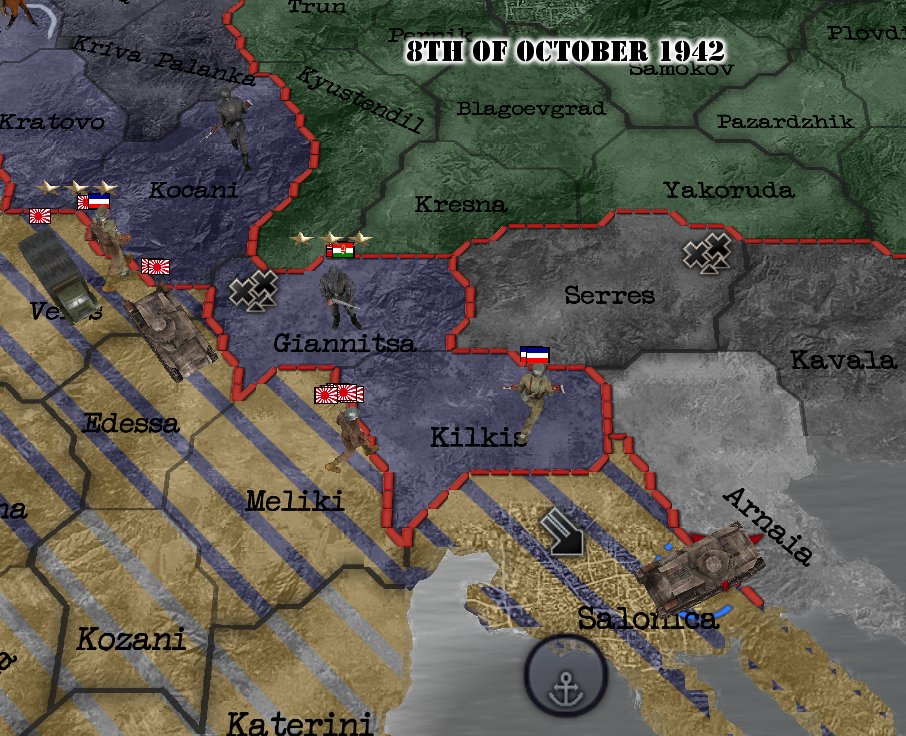
The Emperor nodded.
“The city is defended by the Yugoslavians. Their forces are not very experienced, though. We already recognized this as we attacked their puppet state Albania. In the Balkans, there are only recruits. The experienced forces are fighting the Russians in Hungary and Slovakia. There aren’t many Germans in the area, either.
We want to continue our expansion afterwards. As the communists are advancing, we need to grab as much territory for ourselves as possible in order to limit the Soviet strength after the war as much as possible.
We have improved technologies to support our advance, but those don’t matter at the moment.

The advance in the Balkans is codenamed as Sosa Rakurai (Operation Lightning) and Sosa Kaminari (Operation Thunder). The idea is to use our light tanks in Bulgaria, which has almost no troops defending its borders as almost their entire army is fighting the Russians. The tanks are to secure the key city of this country in as little time as possible so that we can liberate the entirety of Bulgaria from fascism.
This will also give us a port in the Black Sea, thus we can easily attack the Russian core-lands should they dare turning on us.
After this, time is even more essential. If we occupy Bulgaria in time, the Bulgarian armies at the front will disband to return to their countries. This is most likely going to lead to a final collapse of the Eastern front in Hungary, thus the Red Army will soon afterwards be swarming through Yugoslavia. We need to grab as much territory there as possible.”
The Emperor nodded again.
“When is the operation going to start?”
“Fighting in Yugoslavia has already begun to secure supply lines into Bulgaria. The invasion of Bulgaria is scheduled to start at the 20th of October.”
“It will be utter time by then.”
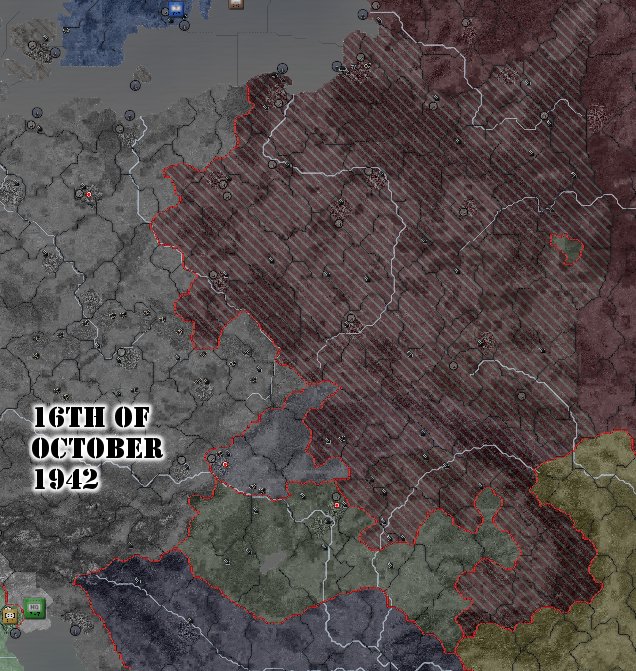
“General, why exactly are we not trying to reach Berlin, i.e. to drive a wedge through Germany that would also stop the Soviet advance?” the Emperor asked.
“Well, your Majesty, there are several reasons for that. First of all, we do lack the troops to keep all parts of the wedge defended, thus the armies we are sending towards Berlin might very likely be cut off sooner or later.
The second reason is that the British would, like in Italy, deny us any reinforcements or support by British troops, because they think an amphibious invasion in France is needed. As we know, this has already failed 4 times.
The third and final reason is Italy. To have success, such an assault would need to be launched from Italy’s ground, but all we conquer would afterwards go to Italy. After two border wars with Russia and the loss of Italy to the British zone of influence, the population wouldn’t accept something like that.”
“You’re definitely right about that.”
-----
30th of October 1942
It had been too easy. The Bulgarians had weapons that couldn’t hit the Mount Fuji even if the soldier stood right before it.
It had taken longer to get to Sofiya than to actually conquer it. The same was also reported from Varna further to the East.
The invasion had taken no longer than ten days, and the population welcomed them like true liberators, being glad that they were saved from being conquered by Stalin, exchanging the fascist devil for the communist one.
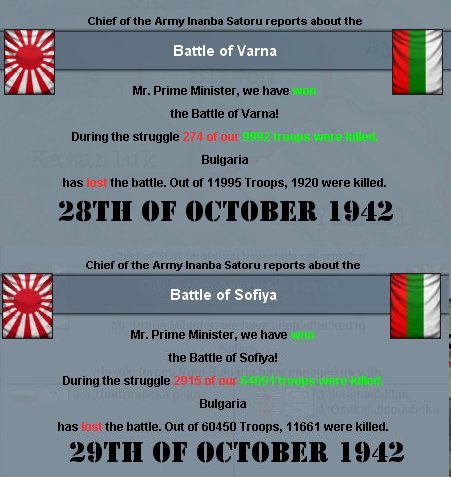


Bulgaria was annexed by the Empire, which was simply calling its holdings in south-eastern Europe the “Balkan Protectorate”.
From what Takumi had heard so far, this meant that the region would be governed by governments that were formed with Japanese support and that they were under protection by the Japanese military for the time being.
As those areas had no longer armies of their own, this was utterly necessary and the population seemed to welcome this, too.
But Takumi couldn’t help but wonder whether the newly founded democracies in the Balkans would have to endure the same starting-difficulties as the Japanese democracy had to.
“Don’t stare holes into the air, or Yugoslavian bullets will soon stare holes into your body.” McFarne said, getting Takumi out of his thoughts.
Immediately after the fall of Sofiya, they had moved north, to the Danube River and were now advancing along its southern edge. To the north, the Red Army was coming and the general idea was to establish the Danube as a borderline between the Empire and the USSR.
They were headed for Beograd, the Yugoslavian capital.
They arrived there one week later, together with the Soviets.
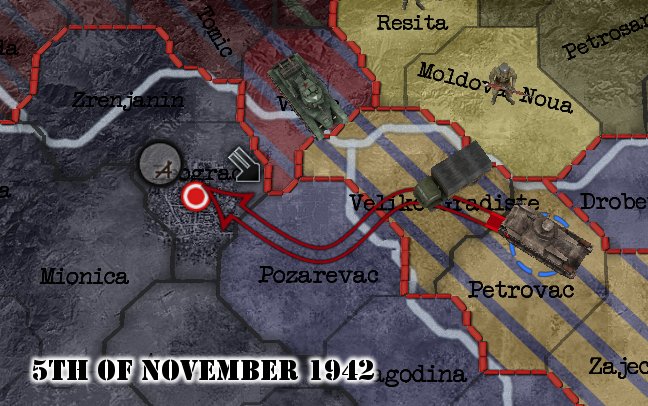
High Command had expected little resistance, as most of the Yugoslavian Army was supposed to be crushed by the Red Army by now. But what ensued was a long series of attacks in which either the Japanese or the Russian army were attacking the city.
In the meantime, the Red Army was pushing deep into Germany. They had reached Berlin already by the 30th of October and, while the battle for the German capital raged on, they were pushing deeper into the Reich, securing as much territory for Communism as possible.

That and the rush for the remaining Balkan regions made one thing clear:
Peace after this conflict wouldn’t last very long, as the current war was creating lots of potential for further conflicts.
2nd of October 1942
“Our brave soldiers have liberated Greece from Axis occupation yesterday, annihilating 3 German infantry divisions in the process. Our time has come. The factories are producing ships, tanks, rifles and supplies for our armies that are fighting in Europe so that you, my people, need not fear war at your doorsteps. Our victories are also opening new markets for our industry, ensuring our ever increasing wealth.

I know many of you are worried about the Soviet advances in Europe. You might be asking yourselves ‘What will Stalin do after he annihilated the Reich?’ or ‘Can there be peace when Communists are ruling two continents?’ Both questions, I am afraid, can only be answered by the future. But do not perish at this! The harder we fight, the better we work, the closer we stand together, the more Stalin will think it a bad idea to attack us.
The army, the fleet and the air-force are working on the fighting, it is your task, my people, to work as hard as possible and to be unified in the will to keep our democracy, as this is why I originally ceased the rule to you.
This is the key to victory!”
The speech was followed by thundering applause.
Honestly, the Emperor hadn’t expected such an applause at the announcement of more overtime and a Total Economic Mobilization law. But the nation stood together as one, willing to carry the war effort.
He felt proud of his people and, once more, Hirohito was confirmed that it had been the right choice to leave the throne to the people.
Some politicians from the parliament congratulated him on the speech before he got into his Mercedes limousine to drive to his residence. He was at war with the Germans, but, in 1936, Hitler had gifted him the limousine as a sign of good will, of course hoping to get Japan into the Axis. He hadn’t succeeded in that, but Hirohito liked the car so he kept it anyways.
As he was formally still the head of the army, he was expected by the country’s general staff for a briefing on what was to come next. He mostly left the decisions to the generals, but he was nevertheless interested in hearing what was going on.
“…So, our forces have taken a bit longer to occupy Greece because we had to withdraw forces from the clearing of the pocket in order to hold its northern edge against the enemy. We have succeeded with minor casualties, though. Currently, our forces are moving towards Saloniki and should be able to occupy it within a week.”

The Emperor nodded.
“The city is defended by the Yugoslavians. Their forces are not very experienced, though. We already recognized this as we attacked their puppet state Albania. In the Balkans, there are only recruits. The experienced forces are fighting the Russians in Hungary and Slovakia. There aren’t many Germans in the area, either.
We want to continue our expansion afterwards. As the communists are advancing, we need to grab as much territory for ourselves as possible in order to limit the Soviet strength after the war as much as possible.
We have improved technologies to support our advance, but those don’t matter at the moment.

The advance in the Balkans is codenamed as Sosa Rakurai (Operation Lightning) and Sosa Kaminari (Operation Thunder). The idea is to use our light tanks in Bulgaria, which has almost no troops defending its borders as almost their entire army is fighting the Russians. The tanks are to secure the key city of this country in as little time as possible so that we can liberate the entirety of Bulgaria from fascism.
This will also give us a port in the Black Sea, thus we can easily attack the Russian core-lands should they dare turning on us.
After this, time is even more essential. If we occupy Bulgaria in time, the Bulgarian armies at the front will disband to return to their countries. This is most likely going to lead to a final collapse of the Eastern front in Hungary, thus the Red Army will soon afterwards be swarming through Yugoslavia. We need to grab as much territory there as possible.”
The Emperor nodded again.
“When is the operation going to start?”
“Fighting in Yugoslavia has already begun to secure supply lines into Bulgaria. The invasion of Bulgaria is scheduled to start at the 20th of October.”
“It will be utter time by then.”

“General, why exactly are we not trying to reach Berlin, i.e. to drive a wedge through Germany that would also stop the Soviet advance?” the Emperor asked.
“Well, your Majesty, there are several reasons for that. First of all, we do lack the troops to keep all parts of the wedge defended, thus the armies we are sending towards Berlin might very likely be cut off sooner or later.
The second reason is that the British would, like in Italy, deny us any reinforcements or support by British troops, because they think an amphibious invasion in France is needed. As we know, this has already failed 4 times.
The third and final reason is Italy. To have success, such an assault would need to be launched from Italy’s ground, but all we conquer would afterwards go to Italy. After two border wars with Russia and the loss of Italy to the British zone of influence, the population wouldn’t accept something like that.”
“You’re definitely right about that.”
-----
30th of October 1942
It had been too easy. The Bulgarians had weapons that couldn’t hit the Mount Fuji even if the soldier stood right before it.
It had taken longer to get to Sofiya than to actually conquer it. The same was also reported from Varna further to the East.
The invasion had taken no longer than ten days, and the population welcomed them like true liberators, being glad that they were saved from being conquered by Stalin, exchanging the fascist devil for the communist one.



Bulgaria was annexed by the Empire, which was simply calling its holdings in south-eastern Europe the “Balkan Protectorate”.
From what Takumi had heard so far, this meant that the region would be governed by governments that were formed with Japanese support and that they were under protection by the Japanese military for the time being.
As those areas had no longer armies of their own, this was utterly necessary and the population seemed to welcome this, too.
But Takumi couldn’t help but wonder whether the newly founded democracies in the Balkans would have to endure the same starting-difficulties as the Japanese democracy had to.
“Don’t stare holes into the air, or Yugoslavian bullets will soon stare holes into your body.” McFarne said, getting Takumi out of his thoughts.
Immediately after the fall of Sofiya, they had moved north, to the Danube River and were now advancing along its southern edge. To the north, the Red Army was coming and the general idea was to establish the Danube as a borderline between the Empire and the USSR.
They were headed for Beograd, the Yugoslavian capital.
They arrived there one week later, together with the Soviets.

High Command had expected little resistance, as most of the Yugoslavian Army was supposed to be crushed by the Red Army by now. But what ensued was a long series of attacks in which either the Japanese or the Russian army were attacking the city.
In the meantime, the Red Army was pushing deep into Germany. They had reached Berlin already by the 30th of October and, while the battle for the German capital raged on, they were pushing deeper into the Reich, securing as much territory for Communism as possible.

That and the rush for the remaining Balkan regions made one thing clear:
Peace after this conflict wouldn’t last very long, as the current war was creating lots of potential for further conflicts.
I suggest you attack USSR before Germany falls. Strike their belly while they are still occupied in the west.
Best plan ever.
Best plan ever.
There is a very exciting strategic situation developing here - I can't wait to see where the final borders are drawn between democracy and communism... and then (as hinted) there is every prospect of another war! 
Chapter 25
11th of November 1942
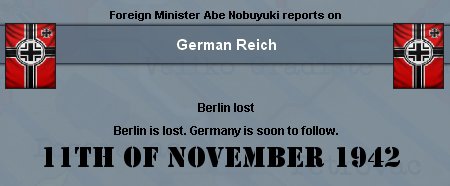
The Red Army was rushing through the streets of Berlin. The city had been surrounded for about ten days by now and the defenders had fought a brave, desperate, and yet unsuccessful battle.
After thorough search, it became known that Hitler had fled the city on the day the Red Army had crossed the Oder River, facing a German line of defense in the Sealow Heights. By now, he had established a new headquarters in Paris, the former French capital, which did now become the new capital of the German Reich.
Among the Allies, this was widely considered to be irony in its purest form.
The Reich established its new capital on the soil of its “hereditary enemy”, as the Nazi propaganda called the French. And now, they had to hide on the territory of this enemy in order to buy themselves and their Reich a few more months of life.
The Red Army continued waltzing through Europe, overrunning every line of defense.
Japanese troops, Takumi’s Platoon among them, occupied Beograd one day later. It should be tha last major gain for the Allies in the Balkans, as the small Japanese force simply couldn’t compete with the sheer size of the Red Army.
In addition to this Japan suffered a supply crisis in Yugoslavia, which slowed down its advance even more.
Once more Takumi and McFarne were left to heavy swearing at the lack of supplies, just like before the invasion of Iraq.
One week after the fall of Berlin, it became obvious that the Wehrmacht was abandoning its defenses in northern Italy, which then lead to a Japanese assault into Austria which aimed at taking as much of this alpine country as possible before the Soviets could.
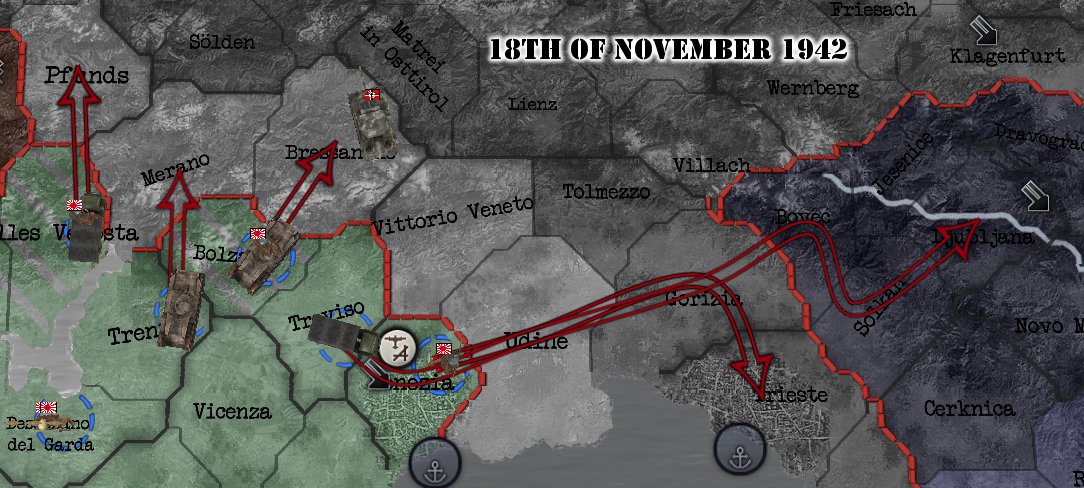
By now, it seemed to Takumi that the Soviet Union was their actual enemy, rather than the Germans who currently found themselves on a road that would lead to them becoming a communist puppet state.
The major goal of the offensive was Innsbruck, a strategically important airfield amidst the Alps which could provide a base for strategic bombing runs in case of an invasion of the USSR.
But those attacks were far off.
Takumi had more urgent problems to deal with.
The war had cost many lives on both sides and now, he and his men found themselves in a country full of women, children and old people. There were almost no men left.
They died either in Russia or defending their home-country.
No one was left to perform agriculture and the soldiers tended to give food to the civilians, gaining their gratitude as well as empty stomachs.
In December, it became obvious who would gain most of the Balkans.

Takumi and his men were ordered to clear out the last remnants of Yugoslavian resistance “on our side of the globe”, as his commanding officer put it.
Due to their slow movement and the lack of supplies, this took them the entire time of December.
But the small offensive into Austria didn’t make any more progress, either.
Innsbruck was occupied under heavy losses, as the Japanese infantry encountered German medium tanks and artillery at the airfield. The Wehrmacht defended it fiercely, but ultimately lost it after about a week of battle.
In north-eastern Italy, the army had encountered a retreating corps of the Wehrmacht and was forced to retreat back to Venice.
The Reichsadler obviously had his feathers cut, but the claws were as sharp as ever.
Dear Misaki,
I once more have to apologize for the lack of responses to your letters, but, once more, we are in a supply crisis because it seems the Greek ports can’t handle our needs and the Bulgarian port we captured, Varna, is in the Black Sea and our convoys may not pass Istanbul, so this port can’t be used.
The army tends to ship more important goods than papers for the soldiers to write on.
Maybe you should really start sending an empty sheet with your future letters.
I don’t know how you at home have accepted the most recent successes of the Red Army.

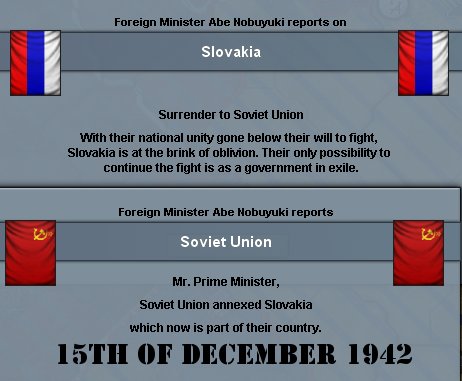
With Hungary, a major Axis nation has fallen.
As it currently seems, the war will be over in February unless the Germans manage, by some wonder, to hold the Soviet advance.
Me and my men have earned the right to go home then, as we took part in all major campaigns of this war. I’m looking forward to this, because I have already missed too much of our daughter’s life and I lost too much time I should have spent with you. Hopefully, I will return for her first birthday, leaving behind a peaceful Europe. I want to see her first steps, hear her first words, be there in every important moment of her life.
So let us hope this madness will end soon.
Love,
Takumi
-----
5th of February 1943
The port of Tirane featured a rainy, yet warm climate during winter.
Currently, Japanese forces were gathering here for a naval invasion of Western France in order to open up another front against Germany and to prevent the USSR from cutting even deeper into Europe.
High Command called this “restoration of the pre-war status quo”, the soldiers called it –in secret, of course- “preparation of World War 3”.
Souta didn’t really care for what it really was. He walked through the streets of Tirane, enjoying the morning sun and looking at the empty harbor, which was currently the major Japanese problem.
There were too few convoys to guarantee supplies for the future bridgeheads in France and, which weighed even more heavily, there were too few transport-ships left after continuous naval encounters with the Regia Marina and German as well as Yugoslavian submarines.
Those transports did also need to be rebuilt, or else the invasion force couldn’t be more than one division at a time.
Once more, the Japanese were damned to wait and let the others fight.
A few days ago, the Russians had annexed another Eastern European nation. This time, it was Yugoslavia.

The Japanese holdings on the Balkans did therefore have a long border with the USSR, which was protected in the north by the fascist yet neutral Romania.
Day after day passed by, and occasional convoys entered the harbor, bringing only what was absolutely necessary. The army mostly relied on the local population for food and water. And the situation didn’t improve with more troops arriving from everywhere within the Balkans.
In the meantime, the British proved that an invasion of France was the right idea.
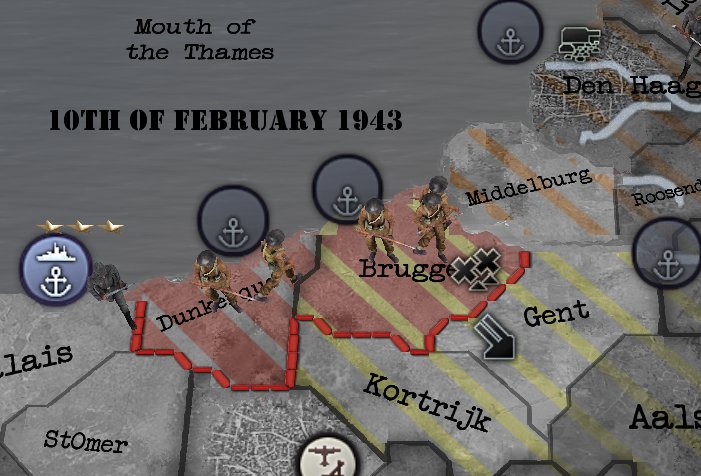
As the Wehrmacht seemed to have thrown almost all of its defenses toward the Russian army, the British could once more land near Calais. And this time, they were successful.
Ironically, the Wehrmacht had managed to push the Red Army back several miles across Germany, and now the Allies fell into their back.
Of course, this accelerated the speed towards the end of the Reich but, on the other hand, this played well into the hands of the Soviet juggernaut.

The British, as stubborn as ever, didn’t listen to the Japanese concerns about it and pushed further inland, aiming to encircle and liberate Paris.
All were on the move, safe for the Japanese.
They were still waiting for their transports and convoys to arrive.
Every day, the number of people waiting in the harbor increased.
In mid-March, Souta had about 30 companions in waiting.
11th of November 1942

The Red Army was rushing through the streets of Berlin. The city had been surrounded for about ten days by now and the defenders had fought a brave, desperate, and yet unsuccessful battle.
After thorough search, it became known that Hitler had fled the city on the day the Red Army had crossed the Oder River, facing a German line of defense in the Sealow Heights. By now, he had established a new headquarters in Paris, the former French capital, which did now become the new capital of the German Reich.
Among the Allies, this was widely considered to be irony in its purest form.
The Reich established its new capital on the soil of its “hereditary enemy”, as the Nazi propaganda called the French. And now, they had to hide on the territory of this enemy in order to buy themselves and their Reich a few more months of life.
The Red Army continued waltzing through Europe, overrunning every line of defense.
Japanese troops, Takumi’s Platoon among them, occupied Beograd one day later. It should be tha last major gain for the Allies in the Balkans, as the small Japanese force simply couldn’t compete with the sheer size of the Red Army.
In addition to this Japan suffered a supply crisis in Yugoslavia, which slowed down its advance even more.
Once more Takumi and McFarne were left to heavy swearing at the lack of supplies, just like before the invasion of Iraq.
One week after the fall of Berlin, it became obvious that the Wehrmacht was abandoning its defenses in northern Italy, which then lead to a Japanese assault into Austria which aimed at taking as much of this alpine country as possible before the Soviets could.

By now, it seemed to Takumi that the Soviet Union was their actual enemy, rather than the Germans who currently found themselves on a road that would lead to them becoming a communist puppet state.
The major goal of the offensive was Innsbruck, a strategically important airfield amidst the Alps which could provide a base for strategic bombing runs in case of an invasion of the USSR.
But those attacks were far off.
Takumi had more urgent problems to deal with.
The war had cost many lives on both sides and now, he and his men found themselves in a country full of women, children and old people. There were almost no men left.
They died either in Russia or defending their home-country.
No one was left to perform agriculture and the soldiers tended to give food to the civilians, gaining their gratitude as well as empty stomachs.
In December, it became obvious who would gain most of the Balkans.

Takumi and his men were ordered to clear out the last remnants of Yugoslavian resistance “on our side of the globe”, as his commanding officer put it.
Due to their slow movement and the lack of supplies, this took them the entire time of December.
But the small offensive into Austria didn’t make any more progress, either.
Innsbruck was occupied under heavy losses, as the Japanese infantry encountered German medium tanks and artillery at the airfield. The Wehrmacht defended it fiercely, but ultimately lost it after about a week of battle.
In north-eastern Italy, the army had encountered a retreating corps of the Wehrmacht and was forced to retreat back to Venice.
The Reichsadler obviously had his feathers cut, but the claws were as sharp as ever.
Dear Misaki,
I once more have to apologize for the lack of responses to your letters, but, once more, we are in a supply crisis because it seems the Greek ports can’t handle our needs and the Bulgarian port we captured, Varna, is in the Black Sea and our convoys may not pass Istanbul, so this port can’t be used.
The army tends to ship more important goods than papers for the soldiers to write on.
Maybe you should really start sending an empty sheet with your future letters.
I don’t know how you at home have accepted the most recent successes of the Red Army.


With Hungary, a major Axis nation has fallen.
As it currently seems, the war will be over in February unless the Germans manage, by some wonder, to hold the Soviet advance.
Me and my men have earned the right to go home then, as we took part in all major campaigns of this war. I’m looking forward to this, because I have already missed too much of our daughter’s life and I lost too much time I should have spent with you. Hopefully, I will return for her first birthday, leaving behind a peaceful Europe. I want to see her first steps, hear her first words, be there in every important moment of her life.
So let us hope this madness will end soon.
Love,
Takumi
-----
5th of February 1943
The port of Tirane featured a rainy, yet warm climate during winter.
Currently, Japanese forces were gathering here for a naval invasion of Western France in order to open up another front against Germany and to prevent the USSR from cutting even deeper into Europe.
High Command called this “restoration of the pre-war status quo”, the soldiers called it –in secret, of course- “preparation of World War 3”.
Souta didn’t really care for what it really was. He walked through the streets of Tirane, enjoying the morning sun and looking at the empty harbor, which was currently the major Japanese problem.
There were too few convoys to guarantee supplies for the future bridgeheads in France and, which weighed even more heavily, there were too few transport-ships left after continuous naval encounters with the Regia Marina and German as well as Yugoslavian submarines.
Those transports did also need to be rebuilt, or else the invasion force couldn’t be more than one division at a time.
Once more, the Japanese were damned to wait and let the others fight.
A few days ago, the Russians had annexed another Eastern European nation. This time, it was Yugoslavia.

The Japanese holdings on the Balkans did therefore have a long border with the USSR, which was protected in the north by the fascist yet neutral Romania.
Day after day passed by, and occasional convoys entered the harbor, bringing only what was absolutely necessary. The army mostly relied on the local population for food and water. And the situation didn’t improve with more troops arriving from everywhere within the Balkans.
In the meantime, the British proved that an invasion of France was the right idea.

As the Wehrmacht seemed to have thrown almost all of its defenses toward the Russian army, the British could once more land near Calais. And this time, they were successful.
Ironically, the Wehrmacht had managed to push the Red Army back several miles across Germany, and now the Allies fell into their back.
Of course, this accelerated the speed towards the end of the Reich but, on the other hand, this played well into the hands of the Soviet juggernaut.

The British, as stubborn as ever, didn’t listen to the Japanese concerns about it and pushed further inland, aiming to encircle and liberate Paris.
All were on the move, safe for the Japanese.
They were still waiting for their transports and convoys to arrive.
Every day, the number of people waiting in the harbor increased.
In mid-March, Souta had about 30 companions in waiting.
When people are not complaining about the lack of AI invasions, they complain about AI invasions 
When people are not complaining about the lack of AI invasions, they complain about AI invasions
Well, I personally like that the British were wasting their forces about 10 times in France until they had a successful invasion.
I do also like the British being successful now, I just wrote that the Japanese don't like it because they do now help the Soviets.
There's something else to complaina bout, though: The borders of Hungary. They are just ridiculous
There's something else to complaina bout, though: The borders of Hungary. They are just ridiculous
Pretty much every country would look like that if you used cultural/national borders instead of political ones.
Well, if you are out of transports, let's hope the British can succeed in liberating one or two occupied countries before they fall into Soviet hands.
Chapter 26
20th of March 1942
Haruji found himself stunned.
For the first time since the beginning of the Second Great War, as the British are calling it, not the war was dominating the news, but a political scandal.
This scandal weighed very heavy, as it even oversounded the most recent events of the war, namely the Japanese landing in France.
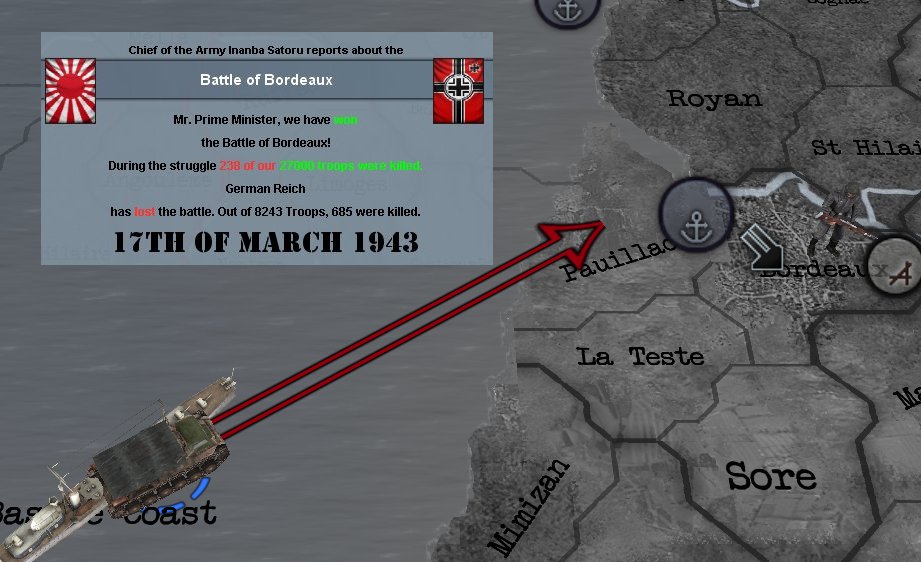
The landing itself should prove to be a disaster, as supply issues denied the Japanese the exploitation of their victory at the landing. They were efficiently trapped in Bordeaux.
In the homeland, a it had become known that a minister had been bribed by companies.
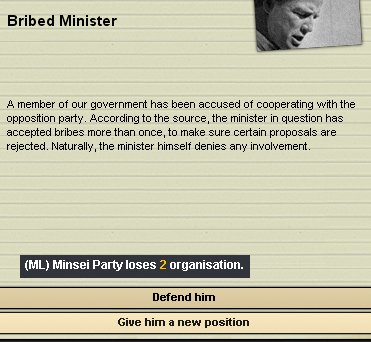
The weapons industry had paid lots of money to the minister in order gain more contracts for new weapons.
Of course, the media made this an issue of national security, because they expected that this was an act of treason. If the company was delivering weapons that paid the most to the government, it wasn’t guaranteed that the army fought with the best weapons available.
The minister was reassigned but did ultimately have to surrender all his political duties later on.
-----
3rd of April 1943
“Alright men, our orders are clear! After our second landing in Brest, our marines were trapped by superior German units and are fighting a desperate struggle! It is our task to land behind the German defenders, cut them off and destroy them!
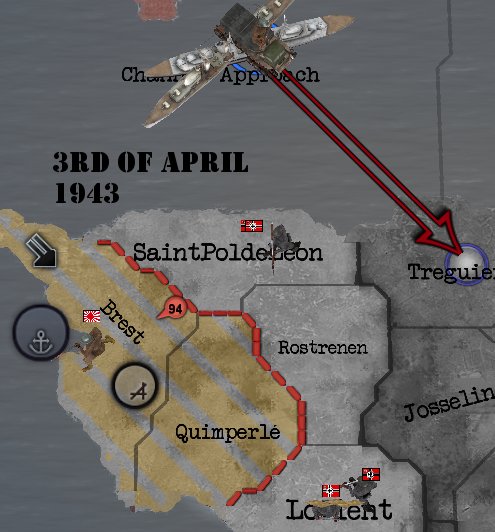
We should catch them by surprise and then we’ll push south to liberate the French ports along the Atlantic coast.”
Takumi repeated the plan once more to his men.
Recent technological advances had enabled them to perform amphibious invasions a lot more efficiently, yet those tactics weren’t really needed at the moment, as they were once more landing at an undefended beach.
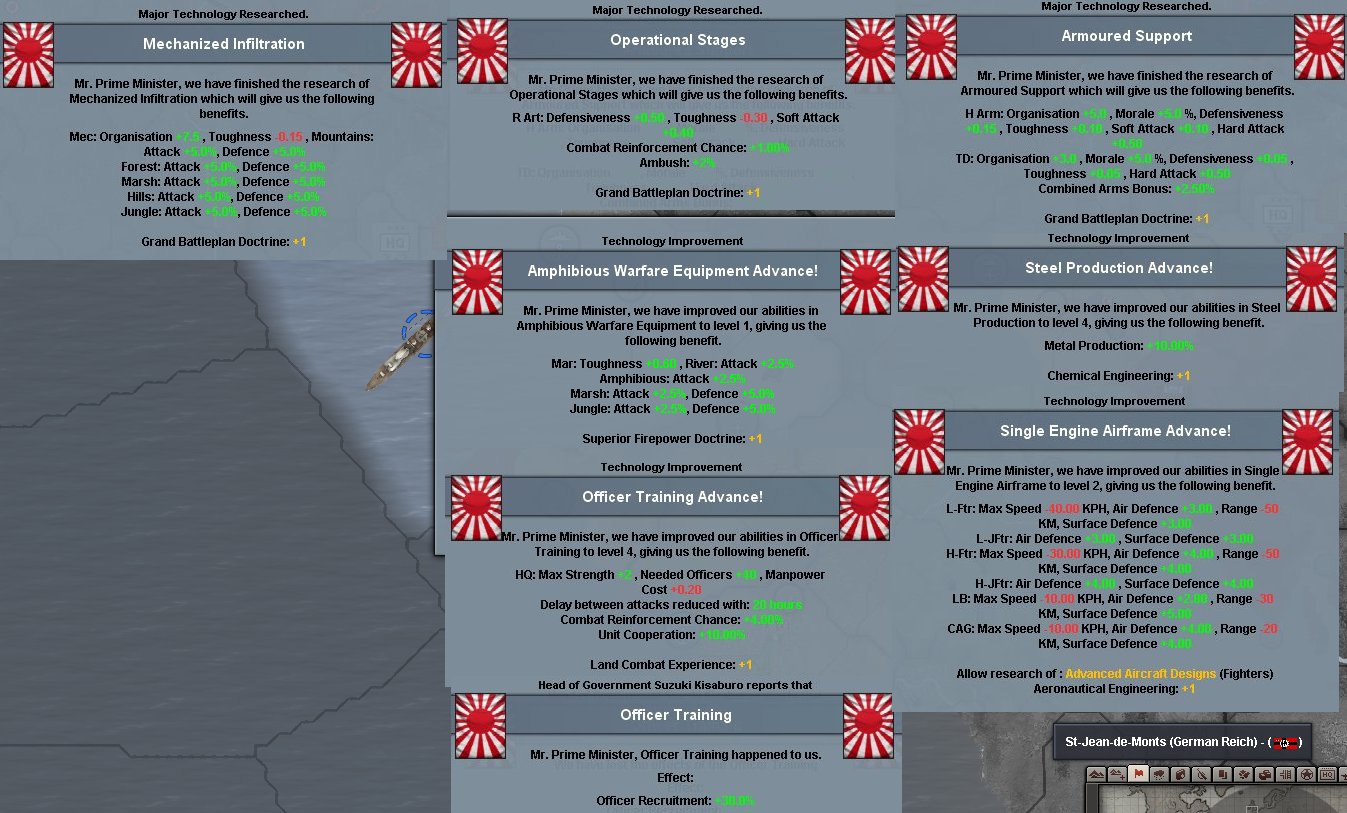
The cliffs offered a stunning view, and Takumi was glad he didn’t have to attack them with the Wehrmacht shooting at them.
The British in the East had just launched their final assault to liberate Paris from Axis occupation, while the Wehrmacht had managed to push the Soviets back from the Weser River towards Hamburg.
It seemed as if the Wehrmacht might just have regained the initiative, but their orders were clear.
Takumi felt that attacking the Soviets now might prove to be the right thing, because then they’d be hit before they could muster the power they’d gain from occupying the entirety of Germany.
High Command, however, ordered to keep fighting against the Axis, as neither the Japanese nor the British wanted to wanted to fight the Axis and the Comintern at the same time.
Instead, the politicians counted on Stalin’s good will to re-establish the pre-war borders after the fall of Germany at least in Western Europe.
Thus, the Soviets would be allowed to keep their holdings in Eastern Europe, but at least the alliance of the Allies could be re-founded.
The fighting in the days after the landing went smoothly, as the Germans were completely surprised by the Japanese attacking them from behind.
As such, they quickly surrendered to Takumi’s motorized units on the 7th of April.
The soldiers they had captured by then had nothing left of the pride that drove them through Poland a few years ago.
Instead, they were meager figures, each of them looking desperate, but also glad that the war had finally come to an end for them.
One of the officers spoke a little English and he asked McFarne and Takumi for a small conversation after his surrender.
At first, both were inclined to refuse, but the German simply started talking.
“Please, you must listen to me. The Russians must not succeed in this war!” he claimed.
“And why is that? Because the Communists are the worst enemies of your damned ideology?” McFarne asked.
“Ideology doesn’t matter. I’m an officer, and I was such even before the Nazis rose to power. But you must listen. I beg you!”
“So tell us what you want to say.” Takumi said calmly, silencing McFarne with a gesture of his hand.
“Thank you, dear sir. Our government has made significant advances in areas that were never entered by technology before. Our scientists have developed long range-radars with which the entirety of Europe can be observed. The Soviets already captured the radar in Königsberg. Should they get their hands on the one in Wilhelmshaven, they’ll be able to monitor all of Europe. By then, Stalin will be invulnerable, he will be able to foresee all possible assaults. Also, we have developed a weapon that’s called ‘Vergeltungswaffe’. In principle, it’s a single, flying bomb whose explosion destroys large areas.
The Russians have already gained lots of knowledge about this weapon, but if they gain all of it, they’ll be able to bomb your cities and you’ll be unable to stop it.”
“Now that’s interesting. First sergeant, get me a radio. I need to contact the Army HQ so that he can repeat what he just told us to High Command.” Takumi said.
This conversation happened on the 6th of April.
On the 7th, paratroopers were redeployed to Britain in order to launch an airborne assault on Wilhelmshaven. High Command had decided that capturing this radar might be of vital importance for the time after the war.
-----
8th of April 1943
Yet, it was too late.
The operation was never launched.
One day ago, the British had managed to capture Paris and with it, the German Reich collapsed once and for all.
As the news about the fall of Paris were spread among the German ranks, the Wehrmacht surrendered unconditionally to its former worst enemy, the USSR.
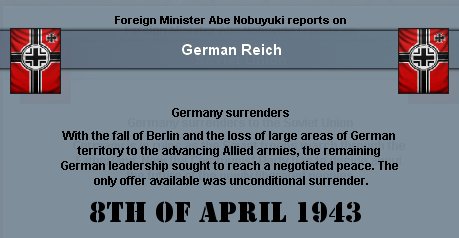
With this surrender, Stalin grabbed all the territory that was once occupied by the Germans, save for the Netherlands and Belgium, in which the British managed to bring in the old exiled governments before the Soviets could move in there.
The Russians also gained access to several Atlantic ports in Western France, which they didn’t re-establish as had been requested by the Allies beforehand.
Also, Poland was to remain part of the USSR instead of becoming a puppet. Germany received its old territories in Silesia for the cost of Eastern Prussia. Thus, Stalin established a communist regime in former Germany and immediately re-armed the Wehrmacht and gave it a huge part of its army as an expedition force.
In fact, Germany was now almost as strong as it had been before the war.
As another war seemed inevitable, High Command made a new plan.
The Japanese were to capture all other nations that had once planned to join the Axis, i.e. Vichy France, Xibei San Ma and, because it aimed at joining the Soviets, Xinjiang.
Those conflicts might easily trigger the conflict with the Russians, but getting those nations under Japanese control meant that the country’s flanks would be clear as well there would be more opportunities for assaults on the USSR.
In the meantime, the world had fallen under a red hegemony.

-----
Author's Note:
i wanted to go for a huge showdown after the fall of the Reich. Therefore, an assault on the RUssians just didn't seem right.
but you might see it, soon....
The onyl countries that could be liberated were the Netherlands and Belgium. Unfortunately, that was all. But things aren't over yet
Yup.
On a sidenote:
Rel life has finally caught up with me. I was done with my A-Levels in early April and now, the period of lots of spare time is over, as I'll start working as a student in a large german company from tomorrow. I'll move into a residential establishment for this and I do only have an old laptop with me that can't run Hearts of Iron 3. So you may expect a slowdown in my update-schedule.
I don't want to let this die, though.
I have already gotten this far now, so I intend to bring it to an end.
20th of March 1942
Haruji found himself stunned.
For the first time since the beginning of the Second Great War, as the British are calling it, not the war was dominating the news, but a political scandal.
This scandal weighed very heavy, as it even oversounded the most recent events of the war, namely the Japanese landing in France.

The landing itself should prove to be a disaster, as supply issues denied the Japanese the exploitation of their victory at the landing. They were efficiently trapped in Bordeaux.
In the homeland, a it had become known that a minister had been bribed by companies.

The weapons industry had paid lots of money to the minister in order gain more contracts for new weapons.
Of course, the media made this an issue of national security, because they expected that this was an act of treason. If the company was delivering weapons that paid the most to the government, it wasn’t guaranteed that the army fought with the best weapons available.
The minister was reassigned but did ultimately have to surrender all his political duties later on.
-----
3rd of April 1943
“Alright men, our orders are clear! After our second landing in Brest, our marines were trapped by superior German units and are fighting a desperate struggle! It is our task to land behind the German defenders, cut them off and destroy them!

We should catch them by surprise and then we’ll push south to liberate the French ports along the Atlantic coast.”
Takumi repeated the plan once more to his men.
Recent technological advances had enabled them to perform amphibious invasions a lot more efficiently, yet those tactics weren’t really needed at the moment, as they were once more landing at an undefended beach.

The cliffs offered a stunning view, and Takumi was glad he didn’t have to attack them with the Wehrmacht shooting at them.
The British in the East had just launched their final assault to liberate Paris from Axis occupation, while the Wehrmacht had managed to push the Soviets back from the Weser River towards Hamburg.
It seemed as if the Wehrmacht might just have regained the initiative, but their orders were clear.
Takumi felt that attacking the Soviets now might prove to be the right thing, because then they’d be hit before they could muster the power they’d gain from occupying the entirety of Germany.
High Command, however, ordered to keep fighting against the Axis, as neither the Japanese nor the British wanted to wanted to fight the Axis and the Comintern at the same time.
Instead, the politicians counted on Stalin’s good will to re-establish the pre-war borders after the fall of Germany at least in Western Europe.
Thus, the Soviets would be allowed to keep their holdings in Eastern Europe, but at least the alliance of the Allies could be re-founded.
The fighting in the days after the landing went smoothly, as the Germans were completely surprised by the Japanese attacking them from behind.
As such, they quickly surrendered to Takumi’s motorized units on the 7th of April.
The soldiers they had captured by then had nothing left of the pride that drove them through Poland a few years ago.
Instead, they were meager figures, each of them looking desperate, but also glad that the war had finally come to an end for them.
One of the officers spoke a little English and he asked McFarne and Takumi for a small conversation after his surrender.
At first, both were inclined to refuse, but the German simply started talking.
“Please, you must listen to me. The Russians must not succeed in this war!” he claimed.
“And why is that? Because the Communists are the worst enemies of your damned ideology?” McFarne asked.
“Ideology doesn’t matter. I’m an officer, and I was such even before the Nazis rose to power. But you must listen. I beg you!”
“So tell us what you want to say.” Takumi said calmly, silencing McFarne with a gesture of his hand.
“Thank you, dear sir. Our government has made significant advances in areas that were never entered by technology before. Our scientists have developed long range-radars with which the entirety of Europe can be observed. The Soviets already captured the radar in Königsberg. Should they get their hands on the one in Wilhelmshaven, they’ll be able to monitor all of Europe. By then, Stalin will be invulnerable, he will be able to foresee all possible assaults. Also, we have developed a weapon that’s called ‘Vergeltungswaffe’. In principle, it’s a single, flying bomb whose explosion destroys large areas.
The Russians have already gained lots of knowledge about this weapon, but if they gain all of it, they’ll be able to bomb your cities and you’ll be unable to stop it.”
“Now that’s interesting. First sergeant, get me a radio. I need to contact the Army HQ so that he can repeat what he just told us to High Command.” Takumi said.
This conversation happened on the 6th of April.
On the 7th, paratroopers were redeployed to Britain in order to launch an airborne assault on Wilhelmshaven. High Command had decided that capturing this radar might be of vital importance for the time after the war.
-----
8th of April 1943
Yet, it was too late.
The operation was never launched.
One day ago, the British had managed to capture Paris and with it, the German Reich collapsed once and for all.
As the news about the fall of Paris were spread among the German ranks, the Wehrmacht surrendered unconditionally to its former worst enemy, the USSR.

With this surrender, Stalin grabbed all the territory that was once occupied by the Germans, save for the Netherlands and Belgium, in which the British managed to bring in the old exiled governments before the Soviets could move in there.
The Russians also gained access to several Atlantic ports in Western France, which they didn’t re-establish as had been requested by the Allies beforehand.
Also, Poland was to remain part of the USSR instead of becoming a puppet. Germany received its old territories in Silesia for the cost of Eastern Prussia. Thus, Stalin established a communist regime in former Germany and immediately re-armed the Wehrmacht and gave it a huge part of its army as an expedition force.
In fact, Germany was now almost as strong as it had been before the war.
As another war seemed inevitable, High Command made a new plan.
The Japanese were to capture all other nations that had once planned to join the Axis, i.e. Vichy France, Xibei San Ma and, because it aimed at joining the Soviets, Xinjiang.
Those conflicts might easily trigger the conflict with the Russians, but getting those nations under Japanese control meant that the country’s flanks would be clear as well there would be more opportunities for assaults on the USSR.
In the meantime, the world had fallen under a red hegemony.

-----
Author's Note:
Attack Soviet nao!
i wanted to go for a huge showdown after the fall of the Reich. Therefore, an assault on the RUssians just didn't seem right.
but you might see it, soon....
Well, if you are out of transports, let's hope the British can succeed in liberating one or two occupied countries before they fall into Soviet hands.
The onyl countries that could be liberated were the Netherlands and Belgium. Unfortunately, that was all. But things aren't over yet
Do I detect an eventual showdown between the Allies and the Commies?
Yup.
On a sidenote:
Rel life has finally caught up with me. I was done with my A-Levels in early April and now, the period of lots of spare time is over, as I'll start working as a student in a large german company from tomorrow. I'll move into a residential establishment for this and I do only have an old laptop with me that can't run Hearts of Iron 3. So you may expect a slowdown in my update-schedule.
I don't want to let this die, though.
I have already gotten this far now, so I intend to bring it to an end.
Wow; quite an impressive Soviet Union you've got there. Best of luck in your new position!
OK, I think you have some serious problems! 
It looks like France didn't even exist as a government-in-exile? Hence a lot of it has been annexed by the Soviets. Bad news indeed. I'm not sure if the British might be able to release France now that they control Paris? Perhaps. If so, you might get Vichy without a war, but the Soviets will probably hang on to the rest.
It looks like France didn't even exist as a government-in-exile? Hence a lot of it has been annexed by the Soviets. Bad news indeed. I'm not sure if the British might be able to release France now that they control Paris? Perhaps. If so, you might get Vichy without a war, but the Soviets will probably hang on to the rest.
Well, looks like the Commies hold the real power in Europe. It's a good thing that Japan gets along well with the USSR and has never fought them or anything... oh, heh, well...
oh, heh, well...
Good luck!
Good luck!
Chapter 27
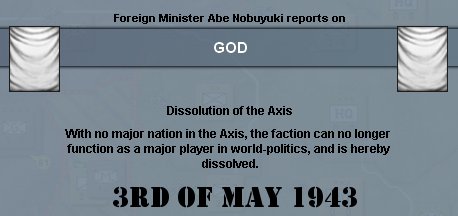
4th of June 1943
The world was strangely quiet.
There was only a mild wind going, which carried the sound of the laughter of a small child.
His child.
He still couldn’t believe it.
He had arrived in Nagasaki just yesterday, seeing his daughter for the very first time. And every moment since then had almost been like paradise.
Takumi didn’t notice that, despite the defeat of the Axis, his country was at war once more.
High Command had asked him to lead a division during the assault on Xibei San Ma, codenamed Sosa Chingisu I (Operation Genghis I). He had refused, saying that he had no experience in leading cavalry an infantry forces. In reality, he had enough of war for the rest of his lifetime, but, as long as the Soviet Union existed, he knew he’d have to go to war once more.
But there was time for that on another day.
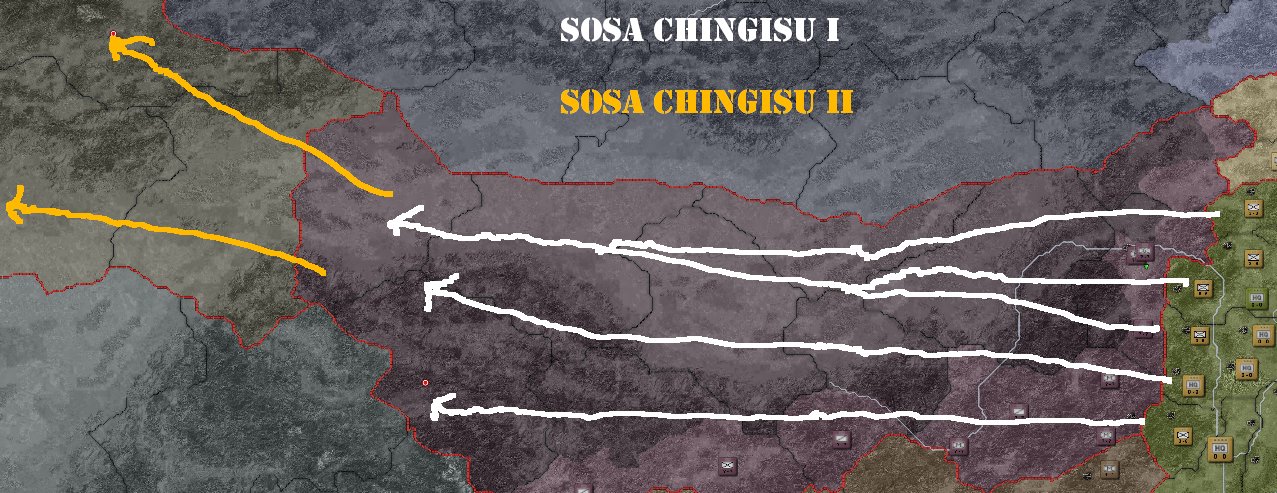
Sosa Chingisu I was part of a larger group of operations in an assault that was simply called “Purging Wars”. The goal of those assaults was to remove the last remnants of pro-Axis regimes along the Japanese border. Xibei San Ma was the first goal of this assault, as it had once been a close ally to Nationalist China and therefore a threat to the Chinese Republic the Japanese had set up after the fall of the nationalists.
Sosa Chingisu II, an operation to occupy Xinjiang, didn’t really fit into that concept, as this country was pro-Comintern.
But, as they were already at it, High Command seemed to have decided to keep any country from joining the Comintern faction. All those attacks resulted in a longer border with the Soviet Union but the Russians had, as Japanese intelligence services had heard, most of its forces in France and Scandinavia. Also, the Wehrmacht had been re-armed by the Soviets and Tiger tanks were now fighting on the same side as IS-2 tanks.
The Republic of China-Nanjing did also have a huge army on its own by now, which was equipped with mostly outdated weapons, but was well able to protect its borders should the need arise.
Therefore High Command deemed such an assault to be safe.
Romania made an exception here, as the country didn’t take part in the war against Germany and did therefore still have a fairly huge army. This army was now protecting the northern border of the Japanese holdings in the Balkans or, as they were called since mid-April, the “South-Eastern protectorate”.
No, the assault he was forced to take part in was scheduled for July or August.
For that he’d have to return to Europe.
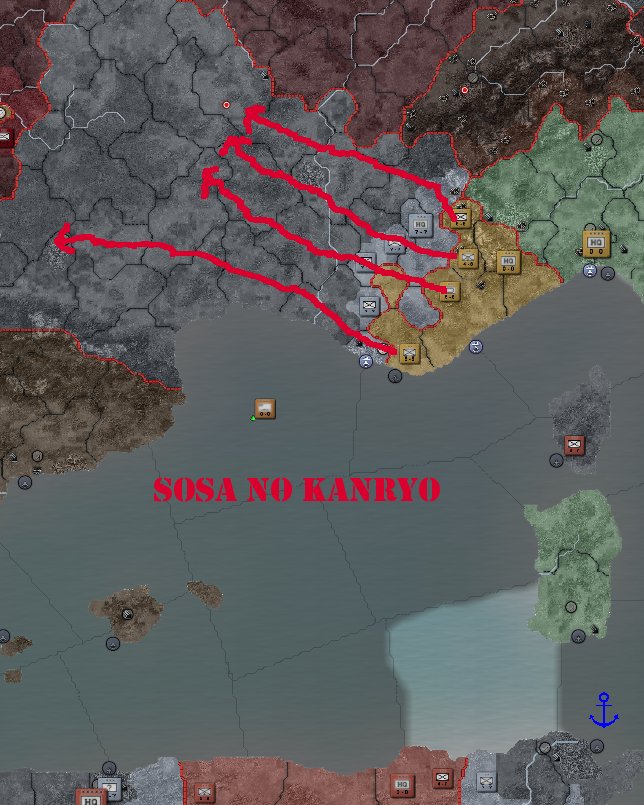
High Command planned taking over France.
The UK had given several forces to Italy, which was now able to guard its borders to Russia on its own, thus the Japanese Army would be able to occupy and hold Southern France. This beachhead into France could allow the Allies to close the gap between Vichy and Paris, which would ultimately trap 25 Soviet divisions and 7 headquarter-divisions.
As Takumi viewed it, the “purging” was only a propaganda measure to hide the more than obvious preparations for war against the Red Bear.
Rumor also had it that Japanese researchers were working on a new, devastating weapon, hoping it would make the war as short as possible.
Takumi, of course, knew only little of this.
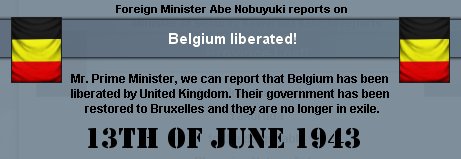
During June, the British had also finalized their efforts in re-installing the former Belgian government in Brussels.
-----
15th of July 1943
Souta belonged to those “lucky ones” that were to remain in Europe for the time being to guard the new Japanese holdings in the area.
As Turkey and Sweden had joined the Allies during May after the Japanese victory against Xibei San Ma, the IJN Kaga had been able to enter the Black Sea and was stationed in the Bulgarian port of Varna for the time being.
Xibei San Ma had surrendered to Japan in late May.
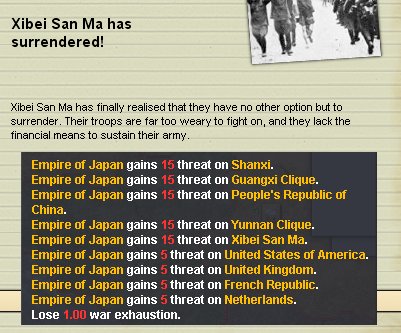

The territory gained had then been given to the Chinese in an effort to make the Japanese look like those who would unify the Chinese under one banner.
The warlords, of course, didn’t like this idea very much. They considered their independence threatened, but they left things at protesting.
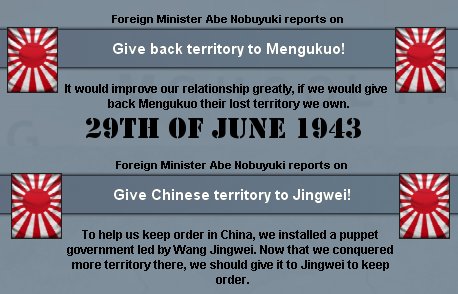
The assault on Xinjiang followed suit.
And this time, the war took only two days.
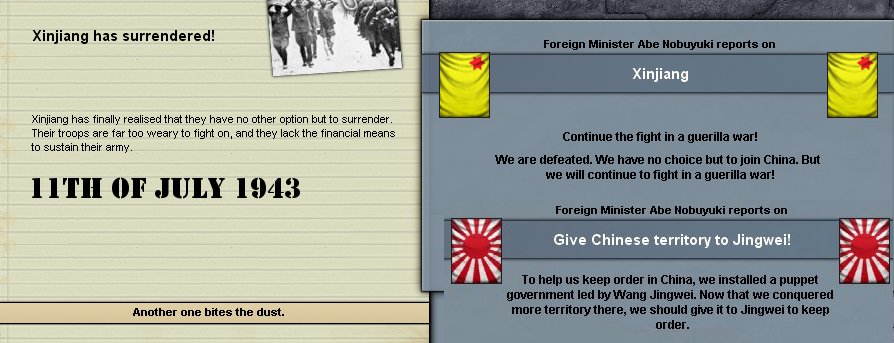
And once more, China received the territory.

With this, the conflicts in Asia were over for the time being.
The Japanese army had acquired the positions it wanted to along the Soviet border and, in the process, had also strengthened its puppets China and Mengjiang.
In Souta’s opinion, those wars weren’t wrong.
Japan was saving those minor nations from being overrun by the Russian hordes, and the recent conquests also improved the general situation of the Allies.
The wars made Japan and the Allies appear more threatening, but, truth be told, war with the USSR appeared inevitable to everyone in the Empire.
So it didn’t really matter when it would come.

4th of June 1943
The world was strangely quiet.
There was only a mild wind going, which carried the sound of the laughter of a small child.
His child.
He still couldn’t believe it.
He had arrived in Nagasaki just yesterday, seeing his daughter for the very first time. And every moment since then had almost been like paradise.
Takumi didn’t notice that, despite the defeat of the Axis, his country was at war once more.
High Command had asked him to lead a division during the assault on Xibei San Ma, codenamed Sosa Chingisu I (Operation Genghis I). He had refused, saying that he had no experience in leading cavalry an infantry forces. In reality, he had enough of war for the rest of his lifetime, but, as long as the Soviet Union existed, he knew he’d have to go to war once more.
But there was time for that on another day.

Sosa Chingisu I was part of a larger group of operations in an assault that was simply called “Purging Wars”. The goal of those assaults was to remove the last remnants of pro-Axis regimes along the Japanese border. Xibei San Ma was the first goal of this assault, as it had once been a close ally to Nationalist China and therefore a threat to the Chinese Republic the Japanese had set up after the fall of the nationalists.
Sosa Chingisu II, an operation to occupy Xinjiang, didn’t really fit into that concept, as this country was pro-Comintern.
But, as they were already at it, High Command seemed to have decided to keep any country from joining the Comintern faction. All those attacks resulted in a longer border with the Soviet Union but the Russians had, as Japanese intelligence services had heard, most of its forces in France and Scandinavia. Also, the Wehrmacht had been re-armed by the Soviets and Tiger tanks were now fighting on the same side as IS-2 tanks.
The Republic of China-Nanjing did also have a huge army on its own by now, which was equipped with mostly outdated weapons, but was well able to protect its borders should the need arise.
Therefore High Command deemed such an assault to be safe.
Romania made an exception here, as the country didn’t take part in the war against Germany and did therefore still have a fairly huge army. This army was now protecting the northern border of the Japanese holdings in the Balkans or, as they were called since mid-April, the “South-Eastern protectorate”.
No, the assault he was forced to take part in was scheduled for July or August.
For that he’d have to return to Europe.

High Command planned taking over France.
The UK had given several forces to Italy, which was now able to guard its borders to Russia on its own, thus the Japanese Army would be able to occupy and hold Southern France. This beachhead into France could allow the Allies to close the gap between Vichy and Paris, which would ultimately trap 25 Soviet divisions and 7 headquarter-divisions.
As Takumi viewed it, the “purging” was only a propaganda measure to hide the more than obvious preparations for war against the Red Bear.
Rumor also had it that Japanese researchers were working on a new, devastating weapon, hoping it would make the war as short as possible.
Takumi, of course, knew only little of this.

During June, the British had also finalized their efforts in re-installing the former Belgian government in Brussels.
-----
15th of July 1943
Souta belonged to those “lucky ones” that were to remain in Europe for the time being to guard the new Japanese holdings in the area.
As Turkey and Sweden had joined the Allies during May after the Japanese victory against Xibei San Ma, the IJN Kaga had been able to enter the Black Sea and was stationed in the Bulgarian port of Varna for the time being.
Xibei San Ma had surrendered to Japan in late May.


The territory gained had then been given to the Chinese in an effort to make the Japanese look like those who would unify the Chinese under one banner.
The warlords, of course, didn’t like this idea very much. They considered their independence threatened, but they left things at protesting.

The assault on Xinjiang followed suit.
And this time, the war took only two days.

And once more, China received the territory.

With this, the conflicts in Asia were over for the time being.
The Japanese army had acquired the positions it wanted to along the Soviet border and, in the process, had also strengthened its puppets China and Mengjiang.
In Souta’s opinion, those wars weren’t wrong.
Japan was saving those minor nations from being overrun by the Russian hordes, and the recent conquests also improved the general situation of the Allies.
The wars made Japan and the Allies appear more threatening, but, truth be told, war with the USSR appeared inevitable to everyone in the Empire.
So it didn’t really matter when it would come.

